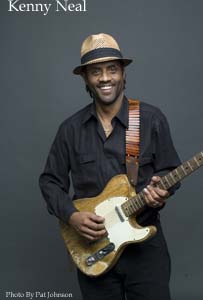Return To The Blues

“Just when you think you’ve got it all figured out/Here comes something, you never dreamed about/Life is so unpredictable, that’s the way it is.
It gets a little hard to bear sometime/Things out of nowhere to blow your mind/But one thing I know for sho’/You’ve got to let life flow.”
Kenny Neal – “Let Life Flow”
Contemporary American blues master and multi-instrumentalist Kenny Neal has traveled a rough road during the past four years. A year-and-a-half ago he was diagnosed with an undisclosed illness that forced him off the road and out of the studio. Neal spent much of his time away from music undergoing liver treatment and recuperating at his California home. In 2004-05, within 11 months, he lost his father (soulful Baton Rouge vocalist/harmonica player Raful Neal, Jr.), brother Ronnie, sister Jackie, and former drummer Kennard Johnson. Let Life Flow (Blind Pig) finds Neal back in the studio creatively attempting to make sense of it all.
It’s a mellow, bluesy CD, but the funk and soul are always there. “Blues, Leave Me Alone” is a funky, horn-driven track reminiscent of Albert Collins. “You’ve Got To Hurt Before You Heal,” a Southern soul ballad about the pain of lost love, mixes well with “Fly Away,” a poetic musing on death that features a lyrical guitar solo with stringed accompaniment. Neal’s meditations on death and loss are not maudlin – they are more of a searching kind, as he attempts to understand and release the pain.
Raised in Baton Rouge, Neal was one of 11 children and encouraged by his father to play music at a young age. Family friends included Baton Rouge natives Buddy Guy, Slim Harpo, and Lazy Lester, all of whom contributed to Neal’s musical development. Let Life Flow finds Neal revisiting his roots with his father’s tune, “Starlight Diamond,” a loping shuffle in which he channels his dad’s harp playing and Harpo’s distinctive vocals. “Bleeding Heart” is another Raful Neal composition. It has that unmistakable rolling New Orleans beat (a la Fats Domino’s “Blueberry Hill”) with a guitar solo reminiscent of early Guy, plus Neal’s signature gritty vocals. He rounds out Let Life Flow with Ivory Joe Hunter’s “Since I Met You Baby” and Willie Dixon’s Latin-tinged “It Don’t Make Sense You Can’t Make No Peace,” a socially conscious number that resonates with our current situation in Iraq.
Prior to his illness, Neal was an ubiquitous presence on the blues scene, traveling worldwide and recording regularly. He still found the energy while sick to host “Neal’s Place,” a 30-minute show on cable TV in the Bay area, where he now lives. “Neal’s Place” features Neal jamming and talking with national and international blues artists. With a book in the works and the May release of Let Life Flow, Neal is once more back at the forefront of the blues where he belongs.
NEW RELEASES: Iron Man is the latest red-hot CD by Arkansas guitarist/vocalist/ songwriter Michael Burks. His flying V puts him in Albert King mode, and in fact the first cut, “Love Disease,” is pure King. He even manages to sing like King, especially on the chilling original, “Icepick Through My Heart.” Burks’ soaring licks and searing guitar also bring to mind Freddie King and Luther Allison . . . Peace, Love & BBQ is pianist/vocalist/songwriter Marcia Ball‘s fourth Alligator album and her first studio set in four years. The album is an uptempo romp through various hot Southern musical styles. Guests include piano-playing buddy Dr. John, accordionists Terrance Simien and Wayne Toups, and vocalist Tracy Nelson among others.
BLUES ALIVE: The Chicago Blues Reunion reconvened at Park West on March 22nd for a live recording to be released later this year on CD and DVD. Hosted by WXRT, a portion of the proceeds was earmarked for the Chicago Coalition For The Homeless. The supergroup includes Chicago blues stalwarts Barry Goldberg (keyboards), Corky Siegel (harmonica), Harvey Mandel (guitar), and Nick Gravenites (guitar/vocals). It was an all-star affair with guests Marcy Levy (vocals), Jimmy Vivino (guitar), and Dave Mason (guitar).
Members of the CBR were there at the inception of what became known as Chicago blues and were instrumental in exposing Muddy Waters, Howlin’ Wolf, B.B. King, Otis Rush, Buddy Guy, and others to a wider audience. They are the survivors of their generation. When you see them, you are also feeling the spirit of their contemporaries like Mike Bloomfield, Janis Joplin, Jimi Hendrix, Paul Butterfield, and other gifted musicians who died too young.
“HAND-WRINGING OUT-OF-CONTROL” COLUMNIST RESPONDS: As to my esteemed editor’s amusement at my non-exclusionary choices for IE‘s “20 Greatest Chicago Guitarists” (that turned into top 35), I feel the need to explain myself thusly:
Back when I was at university, I did the radical thing and took a class in contemporary American literature. I had a healthy respect for the “classics,” but I also enjoyed what was new (back then it was Kurt Vonnegut, John Barth, etc.). I have come to feel the same way about music, especially the blues. While I am happy to give the pioneers their due, I want to see new names and new faces at the forefront of the blues. Many of the familiar faces that kept clubs like B.L.U.E.S. and Kingston Mines thriving (during the Chicago blues renaissance throughout the mid ’70s to the late ’90s) have passed away. The clubs remain open, however, offering blues seven nights a week. Who’s playing them? When I get too down about the situation I remind myself that after all, Mozart was buried in a pauper’s grave.
– Beverly Zeldin-Palmer
Category: Columns, Monthly, Sweet Home











